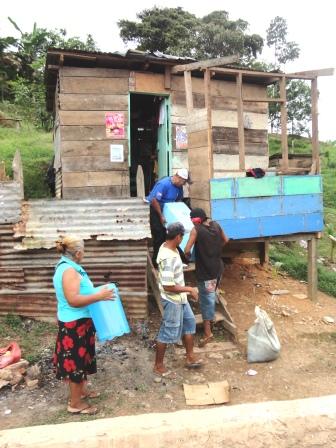–Tamachek saying
By Angela Cacciola -- The application of this concept seems like barely an afterthought for those fortunate enough to live with the assurance of basic services. However, the African Tamachek people resemble those who inhabit the Atlantic coast of Nicaragua. They value clean water as precious, but struggle with its daily acquisition because their country’s history is rife with corruption, political strife, and countless rebellions.
Welcome to Bluefields, Nicaragua, where an ever-increasing population creates serious problems concerning the inadequate supply of clean drinking water. blueEnergy not only builds wells within Bluefields, it also installs biosand filters to purify water with the local people it services. Beneficiaries take a class on water hygiene and sanitation and then spend time in the blueEnergy workshop making their filter. blueEnergy finds participation in this educational and technical process emphasizes the value of the filter, and thus, improves the quality of care and longevity of the project.
By Angela Cacciola -- The application of this concept seems like barely an afterthought for those fortunate enough to live with the assurance of basic services. However, the African Tamachek people resemble those who inhabit the Atlantic coast of Nicaragua. They value clean water as precious, but struggle with its daily acquisition because their country’s history is rife with corruption, political strife, and countless rebellions.
Welcome to Bluefields, Nicaragua, where an ever-increasing population creates serious problems concerning the inadequate supply of clean drinking water. blueEnergy not only builds wells within Bluefields, it also installs biosand filters to purify water with the local people it services. Beneficiaries take a class on water hygiene and sanitation and then spend time in the blueEnergy workshop making their filter. blueEnergy finds participation in this educational and technical process emphasizes the value of the filter, and thus, improves the quality of care and longevity of the project.
 |
| Dump in Diecinueve de Julio |
Last week, blueEnergy installed ten filters in the barrio Diecinueve de Julio (19th of July neighborhood) of Bluefields. Starting the day on the edge of this community’s somking dump, where children and adults roam barefoot scrounging for scrap metal and food, knocks a person into the reality of living in the second poorest country of the Western Hemisphere. Here is a bit about some of the beneficiaries:
Reina Isabelle Fernandez will no longer have to make the twenty-minute journey twice a day to the well for a five-gallon bucket of water. With the aid of her biosand filter, she decontaminates the water from the well just behind her house, for the first time certain its consumption will not breed sickness. While only four people live in her house, the newly filtered water also services the neighbors who buy the fresco (fruit juice) Reina and her husband sell from their home.
 |
| Reina and her husband with their fresco and new water filter |
 |
| Carrying the filter to a one-room squatter house by the dump |

No comments:
Post a Comment